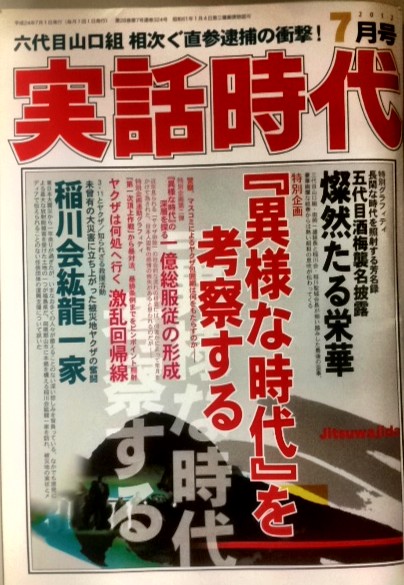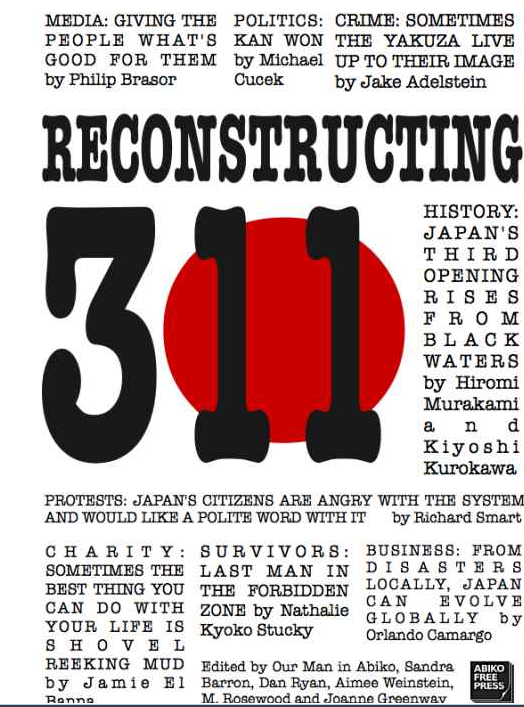“The enemy of my enemy is my friend.”—Yakuza saying.
“It’s partly about living up to the slogans they profess for the yakuza doing the relief work–about helping the weak and fighting the powers that be. That’s the so-called humanitarian way (任侠道)they espouse. It’s also about getting a stake in the reconstruction of Japan. Construction is big business.” –Suzuki Tomohiko, author of Yakuza and The Nuclear Industry, investigative journalist, former yakuza fan magazine editor.
When you think of the first responders in a disaster-ridden country, you think of doctors, firemen, police officers—not usually the mafia, let alone the Japanese mafia aka the yakuza.
There are 79,000 of them in the country, and when you take into consideration their thousands of front companies, affiliated industries, and associated members—they are almost a second army in Japan, and as unlikely as it may seem—they were among Japan’s first responders. I’ve written the best account I could in Reconstructing 3/11 but as time goes by even more details emerge.

When I first wrote about the yakuza and their relief efforts in the Daily Beast after the earthquake, tsunami and nuclear meltdown that devastated Japan on March 11th last year–it was greeted with some skepticism. Admittedly, it wasn’t an easy subject to write about. Public opinion had turned against the yakuza, with good reason, and many of the tattooed gentlemen involved in the work were afraid that media coverage would force the police to crackdown on their relief efforts. There was also a legitimate concern, amongst the yakuza I spoke with, that works done in good faith would be seen as 売名行為 (baimei-koi) or”self-advertisement.”
In this month’s yakuza fanzine, 実話時代 7月号, (Jitsuwa Jidai July 2012 edition), one yakuza group based in Tohoku (東北)aka northern Japan, the Inagawa-kai Koryu Ikka (稲川会紘龍一家)finally goes on the record about their efforts to help out in the crisis. Although there has been some reporting on relief work in the past, other than my own reporting, most of it has been very vague and lacking in details. Jitsuwa Jidai has done an excellent job in detailing the efforts of one local yakuza group in helping their community deal with the aftermath of 3/11. Of course, the nature of the magazine is that they lavish tremendous praise on the group without recognizing that the yakuza are in general a parasite on Japanese society, involved in loan-sharking, financial fraud, extortion and other anti-social activities.
The article focusses on the damage, both from radiation and the earthquake in Koriyama, where the Inagawa-kai Koryu Ikka is headquartered. There is a detailed description of how the Inagawa-kai head office working with the local office collected diapers, chopsticks, cup noodles, flashlights and other daily essentials for the disaster victims–and how they carried the supplies to local city halls and shelters, by truckloads, under the cover of the night. I was unable to independently verify all of the article. Some it rings true–about the city distributing cup noodles but forgetting to distribute chopsticks. Cans of powdered milk but no milk bottles.
The article also points out that not only the Inagawa-kai but many other yakuza groups quietly did their best to help the displaced victims anonymously. The piece closes with a yakuza boss explaining the reasons behind the group activities post 3/11:
“The Inagawa family motto is one word 我慢 (gaman/endurance). This is a time when that motto is very important–in the face of a rain of falling spears or radioactive fall-out. We did our best to protect the people in our local turf. We looked out for the victims and the refugees, without fanfare, as best we could.”
I’d never argue that a few decent acts justify the existence of an organized crime group but we also have to admit that sometimes “bad people” may do good things, and in the face of disaster as a common enemy, there is a short time that we all are friends.
Note: Reconstructing 3/11: Earthquake, tsunami and nuclear meltdown-how Japan’s future depends on its understanding of the 2011 triple disaster is available as a free download today, June 11th. The book is written by several worthy authors but proceeds are not earmarked for charity. I’m giving my cut away and other individuals are doing the same. Just so there’s no confusion. All profits from the predecessor to this work Quakebook went to The Red Cross.

Hardly. The Yakuza have attempted to cash in on the tsunami for their own benefit. These ‘good deeds’ are simply a way to fool people like yourself into believing that the Yakuza are caring in the face of such a disaster. The reality is somewhat different:
http://goo.gl/odyWj
If it was only that simple. Yakuza are human beings as well and some of the relief work was done with good intentions. If you read the whole article and the links you’ll see that we’re not denying selfish motives as well.
[…] Yakuza Go On The Record About 3/11 Relief Efforts In July Fanzine (実話時代) (japansubculture.com) […]